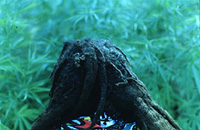![]()
![]()

Dread History:
The African Diaspora,
Ethiopianism, and Rastafari
Terminology
Amharic One of the many languages of Ethiopia; the language of the royal Ethiopian dynasty since the 13th century.
Babylon From a Rastafari perspective, Babylon is the historically white-European colonial and imperialist power structure which has oppressed Blacks and other peoples of color.
Diaspora (dispersion; a migration; the dispersion of an originally homogeneous people). The mass dispersion of peoples of a common culture or national origin is commonly referred to as a diaspora. Historically, these movements tend to be forced or involuntary. They may be the result military occupation, systematic persecution, servitude, enslavement, or laws by which the dominant society defines an ethnic group as marginal, undesireable, or subordinate. These movements also tend to reflect pervasive regional or global forces that separate peoples of common origin form their homeland (real or imagined), leaving them to think of themselves as exiles. Such is the case of the African diaspora which began in the early 16th century and displaced tens of millions of Africans from their ancestral continent to various sites in the New World.
East Indian (Indo-Jamaican, Indo-Trinidadian, etc.): In the Caribbean context, this term is used to refer to individuals who came to the Caribbean (mostly Trinidad, Jamaica, and Guyana) during the late 19th century as indentured laborers (see image gallery).
Elders The term given to individuals of longstanding commitment in the Rasta Movement. In everyday speech, the status of male individuals as elders is often acknowledged by use of the term "Bongo" as an honorific (e.g., addressing someone as "Bongo Hill" or "Bongo Ketu").
Ital The Rastafari term for a saltless and vegetarian diet. Although not all Rastafari adhere strictly to such a diet, it serves as a model for idealized lifeways of practitioners. During Nyabinghi ceremonies (which last for up to a week), an Ital diet is part of the ritual protocol observed by communicants.
Jah In Rasta speech, this term is used as a synonym for Emperor Haile Selassie as the manifestation of the Godhead. The term derives from the Old Testament where it appears as an archaic form of "Jehovah" (see Psalm 68:4).
Maroons A term derived from the Spanish word cimarron, meaning wild or unruly, used to refer to runaway slaves in various parts of the Caribbean. In Jamaica, Maroon settlements formed in the island's mountainous interior as early as the mid-16th century. While small in number compared to the overall population in Jamaica, Maroons retained strong African-derived traditions and remained proud of their cultural heritage. In the 20th century, Rastafari culture has continued to carry forward this African pride in Jamaica and other parts of the Black Diaspora.
Nyabinghi (Ni-uh-bin-gee) This term has a series of overlapping meanings within the contemporary Rastafari Movement. It refers variously to the island-wide religious gatherings of Rasta brethren and sistren at which communicants "praise Jah" and "chant down Babylon," to the three-part drum ensemble on which chants are composed, to the African-derived dance-drumming style performed at these events, and to the corpus of chants themselves. It also refers to the most orthodox organization within the broader Rasta movement variously known as the House of Nyabinghi or the Theocratic Government of Emperor Haile Selassie I. The term Nyabinghi entered the movement in late 1935 during the Italian Invasion of Ethiopia and is actually derived from an African secret society which operated in the Congo and Ruwanda during the last quarter of the 19th century.
Ras Tafari the pre-coronation name of Emperor Haile Selassie I. Ras is an Amharic term equivalent to duke or lord. And Tafari Makonnen was the family name of Emperor Selassie. Rastafari is the same name taken by members of the Rastafari movement who regard the Ethiopian Emperor as the reincarnation of Christ as well as the embodiment of the Godhead.
Reggae Sometimes called "the King's music" or "roots music", reggae is the Rasta-inspired music of black protest which emerged in Jamaica during the late 1960s. Reggae reflects the basic rhythmic influences of Nyabinghi drumming as well as that of other African Jamaican musical traditions. During the 1970s, Rastafari-inspired reggae themes became central to the emergent national consciousness of Jamaicans, both Rastafari and non-Rastafari alike. During this same period, the music developed an international following in Europe, the United States, and on the African continent.
West Indian The term used to refer to the peoples and cultures of the Caribbean archipelago and parts of the Circum-Caribbean rimlands from present-day Belize to Jamaica in the Greater Antilles to Trinidad and Barbados in the Lesser Antilles. Hence, Jamaicans, Trinidadians, Antiguans, and others are often referred to collectively as West Indians. This is a problematic term since it does not refer to a single ethnic, linguistic, or national background. West Indian reflects the multicultural and migrant backgrounds of the populations that comprise the Caribbean as a cultural area.
Zion From a Rasta perspective, Zion refers broadly to Africa and more specifically to Ethiopia as the ancestral homeland of all black peoples. The symbols of Rastafari culture identify with this domain in its various spiritual, cultural, and political connotations.